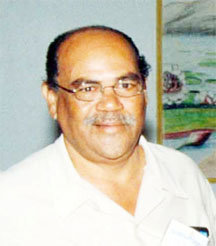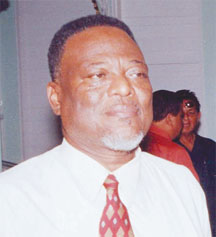Miners will “never” accept a requirement that they give six months notice before they start mining and should such a proposal be implemented, it will compel them to become politically active, according to Executive Director of the Guyana Gold and Diamond Miners Association (GGDMA), Edward Shields.
“It will awaken their political conscience”, the GGDMA Director told Stabroek News. Last week, Prime Minister Samuel Hinds at the first GGDMA meeting for the year told the miners that the proposed six months notice period before mining can commence is “a small time” and warned that “people with excavators and other equipment need to be looking forward to much more even than six months.”
His statement drew an immediate reaction from Shields, who expressed concern. “We thought this was something of the past,” Shields said, while adding that they will have to investigate.

Last year the proposal sparked vigorous protests from miners and a Special Land Use Committee (SLUC) was set up to examine this and other mining issues. Hinds- the Minister responsible for mining, told this newspaper that the SLUC report is still being considered by Cabinet and he could not give a timeline as to when it would be completed.
“It if comes back up, the miners will protest again. There is no if’s and but’s about it”, Shields subsequently told Stabroek News. He said that they will do “whatever is necessary” to ensure that no agency other than the Guyana Geology and Mines Commission has veto power on mining. According to Shields, 70% of Guyanese, one way or another, depend on mining for a livelihood.

He recalled that last year when hundreds of miners had protested in the mining-dependent community of Bartica in Region Seven, other mining-dependent communities such as Mahdia and in the North-West had also planned to march. Shields said that they had asked them to hold until there is an official pronouncement on the issue. He noted they had not yet received an update on the SLUC report.
Hinds, in his speech to the miners had alluded to Article 81 of the Mining Act. He noted that it said that a person with subsurface rights cannot proceed to exercise the right if among other things there is evidence of any agriculture cultivation in the area over the past year. “That is something that we have to take into our minds as we go forward: that our mining leases gives us subsurface rights and they give us right to access the subsurface rights but they don’t give us the surface rights. It’s a new situation but it needs to be known”, said Hinds.
He pointed out that those in the timber business have extended much further than they have been before. The situation is changing and more and more there is a surface rights holder where there are sub-surface rights holders.
He restated that it is not the government’s intention to stop mining but it is probably going to be more regulated and a higher level of performance has to be met. He said it must be anticipated that the sector will be heading in a direction, where, like French Guiana, miners have to restore land before being allowed to work other lands. He said that groups prospecting for gold for small and medium scale operations will certainly be needed.
“We must anticipate mercury no longer being lawfully available. We must therefore find alternatives without mercury for the final concentration step. We must anticipate too that notice of clearing in preparation for mining will inevitably become a requirement and that prompt restoration must follow mining”, said Hinds.





